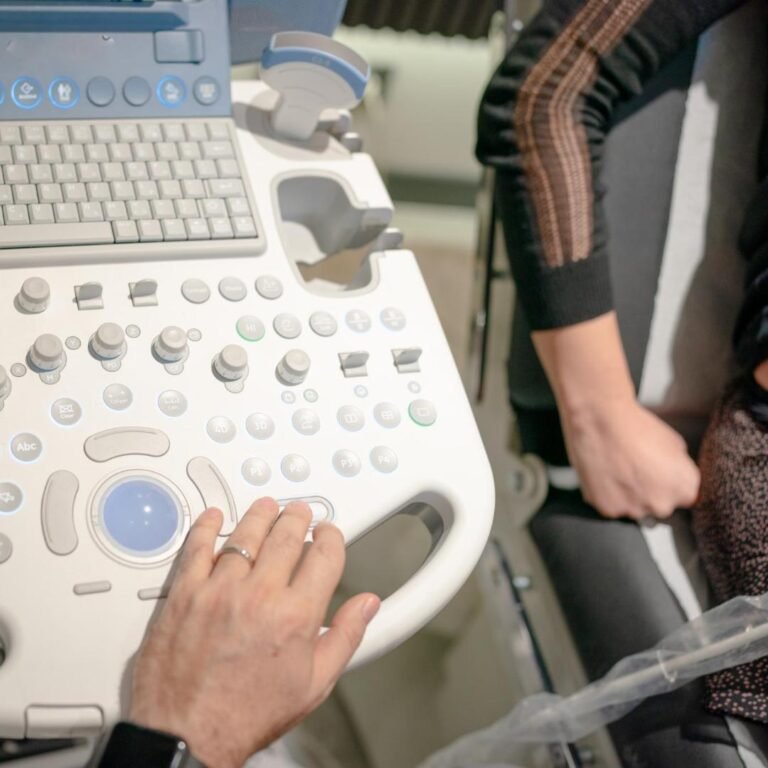With the advent of online education, many prospective students are exploring the possibility of pursuing a career in ultrasound technology through virtual programs. The convenience and flexibility of online learning offer a compelling alternative to traditional classroom settings.
But can you truly become an effective ultrasound technician through an online program? The answer is yes, but with a few important considerations. While online education can successfully deliver the theoretical components of the curriculum, hands-on clinical experience remains essential for developing the practical skills needed for this career.
In this post, we’ll explore how online ultrasound tech programs are structured, what a hybrid learning model entails, and how to choose a program that balances flexibility with the practical training crucial for success in this dynamic field.
Can You Do Ultrasound Tech School Online?

While many aspiring healthcare professionals are exploring the potential of online education, the question remains: can you effectively pursue ultrasound tech school online? The answer is Yes, with certain considerations.
Online programs offer flexibility for learning theoretical aspects, but you must also fulfill interactive training requirements that typically necessitate in-person clinical experiences. Balancing online coursework with practical skill development is crucial for your success in this rewarding field.
Online Learning Approaches
For anyone considering ultrasound technology training, online learning approaches vary widely. Many programs use a hybrid model, combining online lectures and self-paced modules with crucial in-person clinical instruction. This structure allows you to gain theoretical knowledge while ensuring you possess the necessary practical skills to excel in the ultrasound field.
Accreditation and Recognition of Online Programs
On your journey to becoming an ultrasound technician, it’s vital to assess the accreditation and recognition of online programs. Accredited programs are crucial, as they ensure that you receive a quality education that meets industry standards, which can greatly enhance your employability upon graduation.
Schools that offer accredited online ultrasound tech programs have undergone rigorous evaluation by recognized accrediting bodies. This recognition not only validates the program’s quality but often assures that your educational experience meets the requirements set forth by employers and licensing boards.
You should always check the accreditation status of any program you consider, as this can significantly affect your career opportunities in healthcare.
Industry Acceptance of Online Training
Online ultrasound tech programs are increasingly gaining acceptance in the healthcare industry. However, it’s important to verify that your chosen program is viewed favorably by potential employers.
As you navigate your education and future career, understanding how industry professionals perceive online training can help you make informed choices. A growing number of hospitals and clinics recognize the value of hybrid models that incorporate both online coursework and in-person training, leading to a greater acceptance of graduates from accredited online ultrasound tech schools.
This increasing recognition reflects the evolving landscape of healthcare education, allowing you to pursue your passions with confidence.
What Can Be Learned Online: Theoretical Courses
Despite the direct nature of ultrasound technology, you can still gain a solid foundation through online theoretical courses. These courses cover imperative topics necessary for your success in the field, allowing you to learn and understand critical concepts at your own pace.
As you commence on this educational journey, it’s important to know what core subjects will be included in your curriculum.
Curriculum: Core Subjects

Online programs typically include core subjects such as anatomy, ultrasound physics, and patient care. These fundamental areas will equip you with the knowledge needed to perform ultrasound procedures effectively.
Additionally, they form the backbone of your overall training and prepare you for the practical components of your future education.
Online Course Materials: Anatomy, Physics, Patient Care
On the theoretical side, you will have access to a wide array of online course materials that cover anatomy, ultrasound physics, and patient care. This comprehensive approach ensures that you develop a well-rounded understanding of the principles and practices that will be used in the field.
Anatomy courses provide you with an in-depth understanding of human body structures, which is imperative for accurate imaging interpretation. Physics courses will focus on the principles that govern ultrasound technology, helping you grasp how sound waves interact with the body.
Lastly, patient care modules will emphasize the importance of communication and empathy, preparing you for interactions in a clinical setting.
Virtual Simulations and Online Lab Work

Courses in online ultrasound tech programs may also include virtual simulations and online lab work, allowing you to practice your skills in a controlled environment.
These innovative learning tools supplement your theoretical knowledge and are designed to enhance your preparedness for real-world scenarios.
Plus, engaging with virtual simulations not only reinforces the theoretical concepts you learn but also helps you visualize and interact with ultrasound technology. This approach, even if conducted online, contributes significantly to bridging the gap between theory and practice, enhancing your overall understanding and readiness as you prepare for the clinical components of your training.
Benefits of Online Ultrasound Tech Programs
For aspiring ultrasound technicians, enrolling in an online ultrasound tech program offers several advantages that can enhance your educational experience and future career opportunities.
Flexibility and Convenience

Tech-savvy learners will appreciate the flexibility that online ultrasound tech programs provide. You can study at your own pace and schedule coursework around your existing commitments, making it easier to balance work, family, and education.
Cost-effectiveness
Convenience is not the only advantage; pursuing an online ultrasound tech program often proves to be more cost-effective than traditional in-person education. You can save on commuting, housing, and even certain textbook costs, leading to a more manageable financial investment in your education.
Online programs usually have lower tuition fees compared to their on-campus counterparts. Additionally, you can reduce your expenses for transportation and accommodation, which can accumulate significantly over time. This financial relief allows you to focus more on your studies and less on economic stress.
Access to Resources

Any student enrolled in online ultrasound tech programs can benefit from a wealth of digital resources at their fingertips. These may include online libraries, webinars, and interactive tools to supplement your learning experience.
This extensive access to resources not only enhances your understanding of ultrasound technology but also allows you to learn from various educational materials and platforms.
By leveraging these tools, you can gain deeper insights and develop a more comprehensive skill set that prepares you for real-world applications in the field.
Challenges of Online Ultrasound Tech Education
After considering the benefits of online ultrasound tech education, it’s necessary to acknowledge the challenges that come with it. While online learning offers flexibility, it also presents unique hurdles that you must navigate to succeed in your training.
Lack of Hands-on Experience

With ultrasound technology being a highly practical field, the lack of hands-on experience in an online program can hinder your ability to develop crucial skills.
While theoretical knowledge is necessary, operating ultrasound equipment and performing scans require physical practice, which is typically only available through in-person clinical experiences.
Self-discipline and Motivation
Ultrasound studies can be rigorous, and online education demands a high level of self-discipline and motivation. Without a structured environment, you may find it challenging to stay on track, complete assignments, and retain information effectively.
Challenges in self-discipline can become particularly pronounced in the absence of traditional classroom settings where direct interaction with instructors and peers can boost motivation.
In an online format, you are responsible for managing your schedule effectively, setting aside time for study, and actively engaging in the materials provided. This requires intrinsic motivation to push through challenges and maintain focus on your career goals.
Technology Requirements
Ultrasound education necessitates a reliable internet connection and up-to-date technology to access online coursework. Limited access to these resources can impede your learning experience and create barriers to success.
A stable internet connection and adequate technology are fundamental for your online ultrasound tech education. You will rely on video lectures, online simulations, and telecommunication with instructors and classmates. Insufficient access can lead to missed assignments and hinder your overall progress in the program, making it necessary to invest in the necessary tools for an effective learning experience.
Top Online Ultrasound Tech Schools
Keep in mind that choosing the right online ultrasound tech school can set the foundation for your career. Here are some top institutions you may want to consider for your education.
1: Washburn University

Washburn University provides an online degree program in ultrasound technology that caters to individuals seeking a flexible learning environment. This distance education program is specifically designed to accommodate the busy schedules of students who may be balancing work, family, or other commitments.
Through a comprehensive curriculum, students receive extensive training in sonography, equipping them with the skills and knowledge required to excel in the field.
Washburn’s program emphasizes both theoretical understanding and practical application, ensuring that graduates are well-prepared for a career in ultrasound technology. With access to experienced faculty, interactive coursework, and state-of-the-art resources, students can confidently pursue their education while managing their personal and professional responsibilities.
Whether you’re looking to start a new career or advance in your current one, Washburn University’s online program offers the flexibility and support needed to achieve your goals in sonography.
2: Jackson College

Washburn students benefit from a robust online curriculum paired with hands-on clinical experience, ensuring you receive holistic training in the field of ultrasound technology.
Program highlights at Jackson College include an Associate of Applied Science in Diagnostic Imaging. This program prepares you for a career in sonography by combining online coursework with in-person clinical practicum, making sure you gain the practical skills necessary for success in the field.
3: Fort Hays State University

One of the notable online options is Fort Hays State University, which offers a bachelor’s degree in medical Diagnostic Imaging with a focus on ultrasound technology.
Requirements for admission include an accredited associate’s degree, a valid medical imaging license, and completion of prerequisite courses. The program is designed to help you advance your career and earn credentials in ultrasound technology through a flexible online format that caters to your needs.
How to Choose the Right Online Ultrasound Tech Program?

Not every online ultrasound tech program is created equal, so it’s crucial to choose one that meets your needs. Start by thoroughly evaluating factors such as accreditation, curriculum, and faculty credentials to ensure your education is both reputable and comprehensive.
With the right program, you can balance the flexibility of online learning with the vital training required in this rewarding field.
Researching Accreditation Status

Any program you consider should be accredited by the appropriate professional bodies, such as the Commission on Accreditation of Allied Health Education Programs (CAAHEP).
Accreditation ensures that the curriculum meets industry standards and that your education will be recognized by potential employers. Look for programs that emphasize their accreditation status prominently.
Evaluating Program Curriculum and Offerings
Researching the curriculum is vital to ensure it covers both theoretical knowledge and practical skills. You want a program that includes courses in areas like anatomy, patient care, and ultrasound physics, balanced with observational training components conducted on-site or through approved clinical partnerships.
Right off the bat, examine the courses and specialties offered by the program. Ensure that it aligns with your career goals. Some programs may focus on specific areas such as cardiac or vascular ultrasound, while others may provide a broader foundation. The combination of online coursework and vital hands-on experience is critical for you to thrive in the ultrasound field.
Considering Faculty Credentials
Tech instructors with substantial industry experience are paramount to your learning success. Look for programs whose faculty members are not only academically qualified but also have practical, real-world experience in the ultrasound field. This expertise can greatly enhance your educational experience.
Choose a program with faculty who are active in the field and have a passion for teaching. Experienced instructors can provide insights into the latest technologies and practices, helping you grasp complicated concepts more effectively.
Their mentorship can also be invaluable when you transition to clinical practice, as they often share real-world scenarios and professional tips that can prepare you for your future career.
Financial Considerations for Online Programs

Now that you understand the structure of online ultrasound tech programs, it’s imperative to assess the financial aspects involved. Enrolling in an online program can be a convenient way to advance your education and train for a fulfilling career, but costs can vary widely. Below, you’ll find key financial considerations to help you plan your journey.
Tuition and Additional Fees
An online ultrasound tech program will typically feature tuition costs that are often comparable to traditional programs, though you may save on commuting and housing costs. Be sure to consider additional fees such as technology fees, lab materials, or clinical placement fees that might be incurred during your studies.
Financial Aid and Scholarships
An important aspect of financing your education is understanding the availability of financial aid and scholarships. Many online programs offer assistance tailored for healthcare students, which could significantly reduce your overall costs.
Financial aid options may include federal student loans, grants, and institutional scholarships, as well as private scholarships specific to ultrasound technology. It’s advisable to complete the Free Application for Federal Student Aid (FAFSA) to explore eligibility and maximize the funding available to you.
Always check with your chosen institution about their specific scholarship offerings and financial aid packages.
Cost Comparison with Traditional Programs
Programs that are conducted online can sometimes present a more affordable option compared to traditional, in-person education. Here’s a quick breakdown of typical costs associated with both types:
Cost Comparison of Online vs. Traditional Programs
| Cost Factors | Online Programs |
|---|---|
| Tuition (per year) | $8,000 – $15,000 |
| Travel Expenses | $0 – $500 |
| Housing Costs | $0 – $1,500 |
| Lab Fees | $200 – $700 |
With some online programs offering tuition around $8,000 to $15,000 per year, you may find significant savings compared to traditional programs, which can sometimes exceed $20,000 annually. Moreover, the lack of associated travel and housing costs can lower your financial burden even further. It’s important to evaluate total costs thoroughly when making your decision, as this will help you better manage your finances during your educational journey.
FAQs
How much does ultrasound school cost?
The cost of ultrasound tech school can vary widely depending on the program and institution you choose. On average, you can expect tuition fees to range from $5,000 to $30,000 for a complete program. Additional expenses may include textbooks, supplies, and clinical fees, which can increase your overall costs. It’s vital to research different programs and financial aid options to find a solution that works for your budget.
What is the duration of online programs?
Asked how long you’ll need to commit to an online ultrasound program; many programs typically take about 1 to 2 years to complete. This timeline can vary based on whether you choose a full-time or part-time study option, as well as specific program requirements.
Does your chosen program include both coursework and clinical rotations? Keep in mind that while online classes may allow for flexible scheduling, the clinical training typically lasts several months and is often required for program completion. To ensure you’re prepared for a career in ultrasound technology, it’s crucial to factor in this practical experience in your timeline.
Can I work while studying online?
Cost considerations during ultrasound school often lead to the question of whether you can maintain a job while studying. The answer is yes, but balancing work and study requires careful planning and time management.
What you’ll find is that many online ultrasound programs offer flexible scheduling that can accommodate part-time work. However, you should be mindful that requires your presence at clinical settings, which may limit your schedule. To succeed, assess your workload and study commitments upfront to create a manageable routine that ensures you meet both your academic and financial needs.
How do I find a reputable online ultrasound tech program?
To find a reputable online ultrasound tech program, start by looking for programs that are accredited by recognized agencies such as the Commission on Accreditation of Allied Health Education Programs (CAAHEP). It’s also crucial to check if the program offers a strong hybrid model with sufficient clinical placement opportunities.
Reading reviews, reaching out to alumni, and verifying the program’s partnerships with local healthcare facilities can provide additional insights into the quality and effectiveness of the program.
What practical skills will I gain from an online ultrasound tech program?
In an online ultrasound tech program, practical skills are typically developed during the in-person clinical training component. Students will learn how to operate ultrasound equipment, perform various types of ultrasound exams, and interpret diagnostic images under the supervision of experienced healthcare professionals.
Specific skills include patient positioning, the application of ultrasound gel, understanding image quality, and effectively communicating findings. The balance of online coursework and training ensures that graduates are well-prepared for their roles in the healthcare field.
To wrap up
So, as you consider your journey into ultrasound technology, remember that while online programs offer the convenience of flexible experience is indispensable. Choosing a hybrid model that combines online coursework with in-person clinical training will equip you with the necessary skills needed for success in this field.
By carefully selecting the right program, you can enjoy the benefits of online education while ensuring you are fully prepared for a rewarding career as an ultrasound technologist.

Daniel E
Hey there! I’m Daniel E, your friendly tech guide. At MD Techie, I unravel tricky tech stuff, making it easy-peasy for both newbies and seasoned pros. Think of me as your decoder ring for all things geeky!” 🌟🔍🚀
